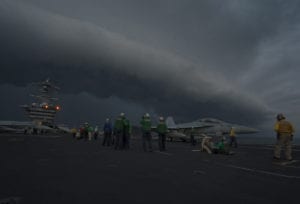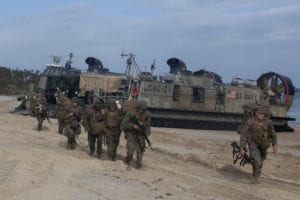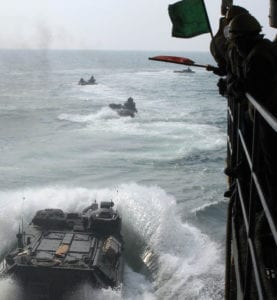When neither sun nor stars appeared for many days and the storm continued raging, we finally gave up all hope of being saved…So keep up your courage, men, for I have faith in God that it will happen just as he told me. (Acts 27:20,25)
Human responses to impending danger vary widely. It’s difficult to know how those around you will act. Until it happens, we can’t really know how we ourselves will behave.
Under Attack
 I think back to September 11, 2001, a day that will live in our memories. Chances are that you can remember exactly where you were and what you were doing when you first got the news about the planes hitting the North and South towers of the World Trade Center.
I think back to September 11, 2001, a day that will live in our memories. Chances are that you can remember exactly where you were and what you were doing when you first got the news about the planes hitting the North and South towers of the World Trade Center.
Most of America got to witness the responses by fellow citizens in New York City. Following the crash of American Airlines Flight 11 into the North Tower at 8:46 AM, most wondered how the plane could have strayed so far off course. At 9:03 AM, when United Flight 175 crashed into the South Tower at 590 miles per hour, we quickly realized that the United States was under attack.
We witnessed brave policemen and firemen, along with other citizens, spring into action to help those in distress. Once the South Tower crashed around 9:59 AM, we saw people trapped on the upper floors of the North Tower making the decision to leap to their death. Others trapped inside made final phone calls to loved ones. Still others frantically searched for escape routes to lower floors. More than likely, others froze in place or prayed in their final minutes of life.
But America soon learned that the terrorist plot encompassed more than New York City. Those at the Pentagon reacted quickly to evacuate victims hurt or killed when American Flight 77 crashed into the western side of the building.
Perhaps, though, the travelers on United Flight 93 faced the chilling effects of terrorism in the most personal and in-your-face manner. Following takeover of American Airlines Flight 93, passengers on board rapidly pieced bits of information together to discover that their plane was on a suicide mission to the Washington DC area. In a heroic effort to prevent more killing, Todd Beamer and several other passengers stormed the flight cabin, overwhelming the hijackers but leaving the plane with no one in control. The giant jet crashed into a field in Sumerset County, Pennsylvania, west of Pittsburg. No survivors.
Ripple Effect
Ten years following 9/11, America is still responding. Of course, many associated with the military continue to be directly impacted by decisions stemming from the terrorist attacks. War in Iraq and Afghanistan continues, and multiplied thousands of servicemen and women have served or still serve in harm’s way. Their families and loved ones share in their sacrifices.
The rest of us, in one way or the other, have made choices that affect how we remember and process the traumatic events of that day. These decisions also impact our future- how we think and behave as we move ahead collectively and individually.
Stress & Trauma
I’ve intentionally selected 9/11 to get you thinking about stress and the wide range of options for responding to it. Stress is a reality, and it’s critical that each of us learn some things about adversity and stress, particularly how we personally respond in these kinds of situations.
We’re not robots; we do have the capacity to choose. But learning to make healthy choices is not automatic.
We need to understand the impacts of trauma and stress and learn from the past. Assessing the behavior of others along with our own responses to stress can be helpful as well. We can explore alternative ways to handle stress and compare the merits of each. All in all, there has never been more information available.
But let me suggest another source for coping with stress, and there is nothing new about this approach.
It simply involves placing our faith in God.
Stability found in Faith
Doubtlessly, you remember the role of faith during 9/11. I personally can’t remember a time when our nation turned to God for strength, guidance, and support as much as during this period of national crisis. While some still seek God for help, most Americans have returned to their normal schedule, one that includes much less conscious dependence upon the Lord. I’m not trying to be critical. This is simply the way it is.
The question for each of is not whether we will face trauma and crisis in the future. The issue is how we will respond. Are you satisfied with the way you handle stress? Do you think and act in ways that are healthy and constructive? What do others say about you during times of stress? When periods of confusion and chaos happen, do you help or hinder? When trouble strikes, what sort of example do you set for your spouse or children? Overall, how are you doing in coping with stress as you consider the future?
Regardless of how well or how poorly you handle stress, you can get better. You can help others around you deal with their pressures more effectively. How? By learning to trust God in tight situations. God has been helping people since Adam and Eve. He’s all too willing to help you.
Destination Rome
 Consider an incident in the Apostle Paul’s life. He was a Roman prisoner on his way to Rome to get a hearing with the Emperor, Caesar. Under the care of a Roman centurion, he and 275 other men boarded an Alexandrian ship bound for Italy. Paul sensed that setting sail at this time was not advisable, and he warned the centurion and the ship’s crew that sailing at that time could jeopardize their lives. His advice was ignored. They set out for the island of Crete, hoping to harbor there for the winter.
Consider an incident in the Apostle Paul’s life. He was a Roman prisoner on his way to Rome to get a hearing with the Emperor, Caesar. Under the care of a Roman centurion, he and 275 other men boarded an Alexandrian ship bound for Italy. Paul sensed that setting sail at this time was not advisable, and he warned the centurion and the ship’s crew that sailing at that time could jeopardize their lives. His advice was ignored. They set out for the island of Crete, hoping to harbor there for the winter.
Although the weather was initially mild, it deteriorated rapidly. Soon they found themselves in a violent winter storm with no ability to control their direction. Over the next few days, the crew started throwing all unnecessary weight overboard in an effort to lighten the ship. Days passed with no change. Survival appeared unlikely.
Luke summed up the situation in verse 20: we finally gave up all hope of being saved. Luke was not the only one. Apparently everyone else on board had the same perception- that is, except for Paul, who had a quite different view. He stood up and addressed everyone on the ship. He told how an angel of God had visited him and assured Paul that he would make it safely to Rome. The angel also indicated that everyone on board would survive as well.
Faith in Chaos
Paul believed the angel’s words and now shared his faith and hope with the others. He gave them instructions and told everyone to eat something to gain strength for the ordeal they were about to experience. Just as Paul predicted, the ship ran aground as they approached the island of Malta. Miraculously, all on board swam or rode pieces of the ship safely to land. Everyone survived, just as the angel had promised.
Can this story from Paul’s life teach us something about handling stress in our lives today? Absolutely. But we must not only learn it; we need to apply it.
Reflection
 First, the storm appeared, posing life threatening danger to everyone on the ship. It was unavoidable. Many of the traumatic, stress producing events in our lives can’t be avoided. They simply happen.
First, the storm appeared, posing life threatening danger to everyone on the ship. It was unavoidable. Many of the traumatic, stress producing events in our lives can’t be avoided. They simply happen.
Second, just as those on board the Alexandrian ship got to choose their outlook, so do we. Everyone on the ship, except Paul, viewed the situation by the way it appeared to their natural eye. It truly did seem as though the end was near.
But Paul made a different choice, the choice of faith. Despite the visible evidence all around him, Paul elected to put his trust in God. He assumed a leadership role and was instrumental in saving the lives of everyone on board.
Although it is likely that you are not facing a life versus death situation, stress may still be affecting your life in many negative ways. No one stressor seems to be that bad, but the cumulative effects are making your life miserable. You keep hoping that tomorrow will be a new day. But each morning brings the same stresses, the same negative feelings, and the overall feeding that life is overwhelming you. Chances are that you’re a stressor for those around you.
Application

Is there hope for you? The answer is yes- definitely! The answer probably won’t come in one miraculous step, but in a series of smaller steps that can help you get your life on the right track. To summarize, consider the following:
• Stress is universal. Everyone experiences it.
• While you can’t usually control what happens, you can control your response. You choose.
• It helps to identify the stressors in your life. In doing so, don’t simply identify the symptoms. Try to get to the real issues. Seek the help of others you trust to assist you in this process.
• Select one or two stressors to work on. Don’t try to tackle everything at once.
• Decide what needs to change and make plans. One caution here: even if you have tried and failed numerous times previously, don’t let your past dictate. Try again!
• Celebrate your successes, but don’t get down on yourself if you fall short. Try again. Adjust your plans and expectations if necessary.
• Commit your plans to the Lord. If you do, they will succeed (Proverbs 16:3).







